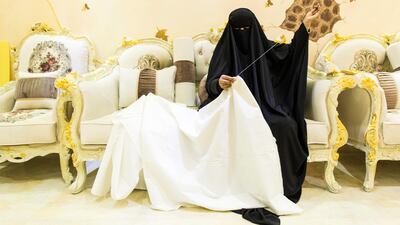Paying tribute to the dead is a personal act which comes in many forms, some visit cemeteries, others simply remember, but Ayisha Ghareb — a mother who suffered arguably the greatest loss to death — chooses to honour the dead by caring for their bodies.
Ms Ghareb is the mother of Mohammed Yousef, a member of the UAE Armed Forces who died in Yemen in September 2015 in a rocket attack which killed about 50 Emirati soldiers.
She has been washing the bodies of the dead for 35 years.
“I was eight months pregnant with my fourth son when an ambulance came to our neighbourhood carrying a dead woman, I ran to the ambulance and helped moving her to the house and asked to help with the washing ritual,” says Ms Ghareb.
“The lady who used to wash the dead in our area was surprised to see me having all the courage and willingness to participate, so she taught me everything I need to know about it according to Sharia.”
The 57-year-old mother of 10 from Kalba was only 22 when she began performing ritual body washing and was considered the youngest body-washer at the time.
Her interest in the craft came from seeing the care her grandmother would give babies.
_______________
Read more:
After death of daughter, woman finds solace as body washer
Emirati morticians deeply affected by death of little girl
Working at mortuary a source of solemn pride for Emiratis
_______________
“My grandmother was a midwife and she used to help women during pregnancy and birth, and I thought that the dead should be in good hands too, same as newborns, so I started performing the ritual to honour the dead and pay them respect,” she says
Washing the body of the dead before burial is obligatory in Islam. The ritual can take place in a mosque — in sections devoted to the ritual — or at home and are attended by family members who take part.
According to Sharia law a man’s body should be washed by men and a woman’s body by women.
Ms Ghareb provides this service without financial reward. She performs the ritual either at a mosque or at the family’s home, prepares the cleansing materials and sews the shroud by hand.
“I feel rewarded when I see the satisfied look on the faces of the family of the deceased, I feel content for obeying Allah and his orders by performing the ritual according to Sharia, and I feel grateful for having the opportunity to do that,” she says.
“I sew the shrouds, I buy and mix the ingredients to scatter on the Shroud, prepare Sidr (Ben leaves) to add it to the water for cleansing, camphor and Oud for good scent and Zamzam water.”
She has washed countless bodies, including her own aunt.
“My aunt was like a mother to me she raised me and took care of me and I took care of her while she was alive and after her death,” says Ms Ghareb.
“Knowing that the deceased will get the treatment they deserve before burial, gives me peace of mind and purifies my soul, and I wish to see more people working in this field and learning the best practices according to Sharia.”
She says the ritual reminds her to be kind to others and always perform good deeds.
“It brings me closer to God. Life can end in second and only good deeds can last forever.”
Though the job may seem peculiar, Ms Ghareb has always had the support of her family.
“My son Mohammed was one of my main supporters and now his kids support me too,” she says.
Ms Ghareb says the country and its leaders are also a strong source of support and pride.

